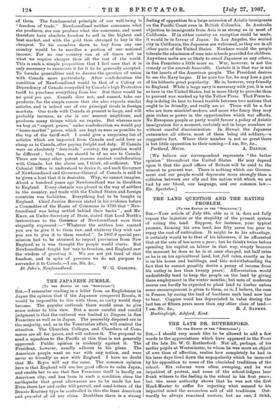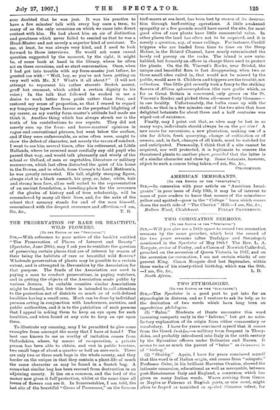THE LATE DR. RUTHERFORD.
[To THE EDITOR OW THZ "SPXOTATOR."
SIR,—I should very much like to be allowed to add a few words to the appreciations which have appeared in the Press of the late Dr. W. G. Rutherford. Not all, perhaps, of his earlier pupils at Westminster, to whom he was more an object of awe than of affection, realise how completely he had in his later days lived down the unpopularity which he incurred by his opposition to some of the cherished traditions of the school. His reforms were often sweeping, and he was impatient of protest, and some of the school-ledgers bear frank witness to the feeling in the school in his first years; but the same authority shows that he was not the first Head-Master to suffer for, rejecting what seemed to his impartial mind the savourless salt of old traditions. . Out- wardly he always remained austere, but no one, I think,
ever doubted that he was just. It was his practice to have a few minutes' talk with every boy once a term, to many of us the only occasions on which we came into direct contact with him. He had about hint an air of distinction and greatness which never failed to remind us that he was a Head-Master and not merely a superior kind of assistant. To me, at least, he was always very kind, and I used to look forward to those interviews. He would ask some casual question suggested by the moment, by the sight, it might be, of some book at band in the library, where he often sat on these occasions, and so start conversation. Once, when I had got into trouble with my form-master just before, he greeted me with : "Well, boy, so you've not been getting on very well with Mr. X? What's it all about?" (I will not attempt to represent his rather staccato Scotch accent, gruff but resonant, which added a certain dignity to his voice.) In the talk that followed he evoked in me a desire to work better from pride rather than fear, and restored my sense of proportion, so that I ceased to regard my temporary lapse from favour as the perpetual blighting of my career, as my worthy form-master's attitude had made me think it. Another thing which has always struck me is the truth of his contributions to our reports. They did not merely sum up the form- and house-masters' opinions in vague and conventional phrases, but went below the surface, and if they were unfavourable, as mine often were, sought to show the defect of character, not merely the errors of conduct.
I went to see him several times, after his retirement, at Little Hallands, where he received most cordially any old pupil who passed that way, and would talk pleasantly and wisely of the school or Oxford, of men or vegetables, literature or military ma.nceuvres, which last often disturbed the quiet of his home in the Downs, and in which, from Caesar's to Lord Methuen's, he was greatly interested. His tall, slightly stooping figure, always clad in a black cassock, his grey, or, later, white, hair and strong lean face, all so well suited to the representative of an ancient foundation, a breeding-place for the reverence of the glories of history and of true scholarship, will be remembered by many all their lives, and, for the sake of the school that memory stands for and of the man himself, remembered with the deepest reverence and affection.—I am,







































 Previous page
Previous page